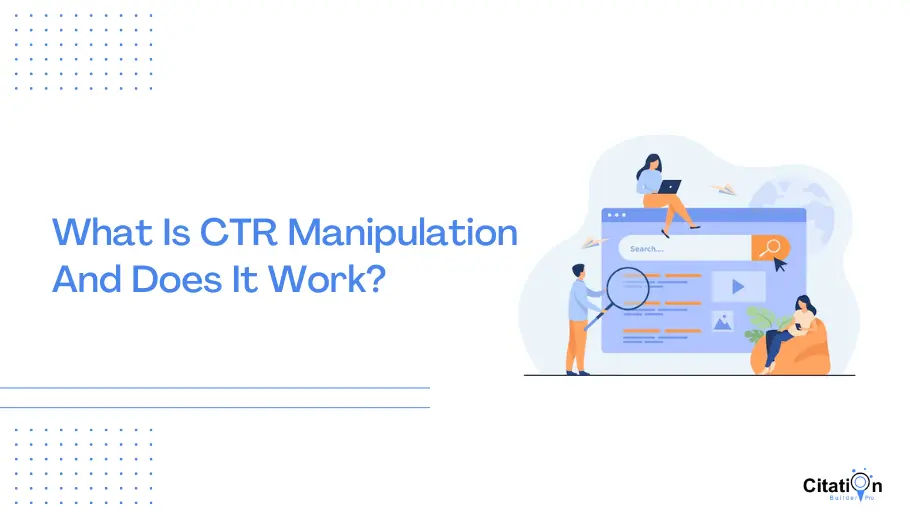Exploring the Partnership Between CTR Control Solutions and Customer Actions
In the world of digital advertising and marketing, the impact of click-through price (CTR) manipulation services on user actions remains a facility and interesting topic. As on-line systems progressively rely upon CTR metrics to determine the success of web content, products, and solutions, understanding exactly how these manipulated rates influence customer involvement and decision-making procedures is extremely important. The interaction in between CTR adjustment and customer actions raises concerns concerning credibility, trustworthiness, and the moral effects of such techniques. By studying the complex connection between CTR adjustment solutions and individual actions, intriguing insights arise that might reshape our understanding of digital marketing techniques and their impacts on consumers.
Influence of CTR Control on Behavior
Examining the influence of Click-Through Rate (CTR) manipulation on user behavior discloses important understandings into the dynamics of online interaction. CTR manipulation involves unnaturally inflating the variety of clicks on a specific web link or promotion to trick individuals and internet search engine. This practice can result in a distorted understanding of a webpage's popularity or importance, eventually affecting customer actions.

Additionally, CTR adjustment can alter the data utilized by formulas to customize individual experiences. This can lead to customers being offered web content that does not line up with their choices or interests, ultimately resulting in a decrease in user complete satisfaction and engagement. Understanding the impact of CTR adjustment on customer habits is vital for preserving openness and count on on-line interactions.
Customer Interaction With Adjusted CTR
Individual interaction with manipulated CTR data often results in skewed understandings of on the internet material popularity and significance. When users interact with content based upon unnaturally filled with air Click-Through Rates (CTR), they might believe that certain information, items, or services are extra preferred or trustworthy than they in fact are. This can cause individuals choosing based upon misleading information, causing potentially negative results.
Interaction metrics like sort, shares, comments, and time invested in a web page are frequently influenced by CTR adjustment. Customers may be much more likely to engage with content that appears to have greater interaction rates, additionally continuing the cycle of manipulated assumptions. Because of this, content developers and marketers might prioritize generating web content that produces high CTR instead of see page concentrating on producing truly useful and appropriate product.

Psychological Effects of CTR Manipulation

Furthermore, the psychological impacts of CTR adjustment can additionally show up in altered decision-making procedures. Users may be more inclined to click content only based upon its perceived appeal, as opposed to its real worth or relevance to their requirements. This behavior change can result in a click this link shallow interaction with online web content, where users might ignore high-grade yet much less popular offerings for those with artificially increased CTRs.
Essentially, the psychological implications of CTR control highlight the value of maintaining transparency and credibility in online communications to cultivate authentic customer involvement and count on.
Moral Factors To Consider in CTR Control
CTR manipulation raises issues regarding tricking individuals, misshaping information analytics, and compromising the reputation of on the internet material. By artificially blowing up CTR, users may be misinformed into clicking on web links or advertisements they would certainly not have picked or else, leading to a disingenuous online experience.
One more ethical element to contemplate is the justness of manipulating CTR to obtain an unfair advantage over competitors. Engaging in such techniques not just breaches concepts of fair play however additionally undermines the trust fund that individuals put click to read in online systems. It is vital for services and electronic marketers to support ethical criteria in their techniques to ensure openness, integrity, and lasting sustainability in the online setting.
Effects for Digital Marketing
With the enhancing dependence on electronic systems for advertising objectives, the technique of controling click-through rates (CTR) presents significant implications for the efficiency and integrity of digital marketing methods. CTR adjustment can bring about manipulated information analytics, misdirecting marketing experts right into thinking that their campaigns are executing better than they really are. This can cause misallocation of sources, with business purchasing underperforming strategies based on falsified CTRs. When users realize that CTRs have been controlled, it can deteriorate trust in the brand, leading to long-lasting adverse repercussions for consumer commitment and brand name online reputation.
In addition, using CTR control services can develop an unfair competitive landscape, where firms that participate in such techniques acquire an artificial benefit over those that follow honest advertising and marketing criteria. This can stifle development and creativity in electronic advertising and marketing, as success ends up being more concerning adjustment techniques than supplying authentic worth to customers. Ultimately, the implications of CTR adjustment for electronic advertising prolong beyond temporary gains, affecting the general sustainability and integrity of advertising and marketing initiatives in the electronic realm.
Final Thought
In conclusion, the connection in between CTR control solutions and individual actions is complex and complex. The impact of CTR adjustment on habits, individual involvement with manipulated CTR, emotional impacts, moral considerations, and ramifications for digital marketing all play a function in forming this partnership. Recognizing these dynamics is essential for online marketers and researchers alike in order to navigate the ethical implications and make the most of the performance of their digital marketing techniques.